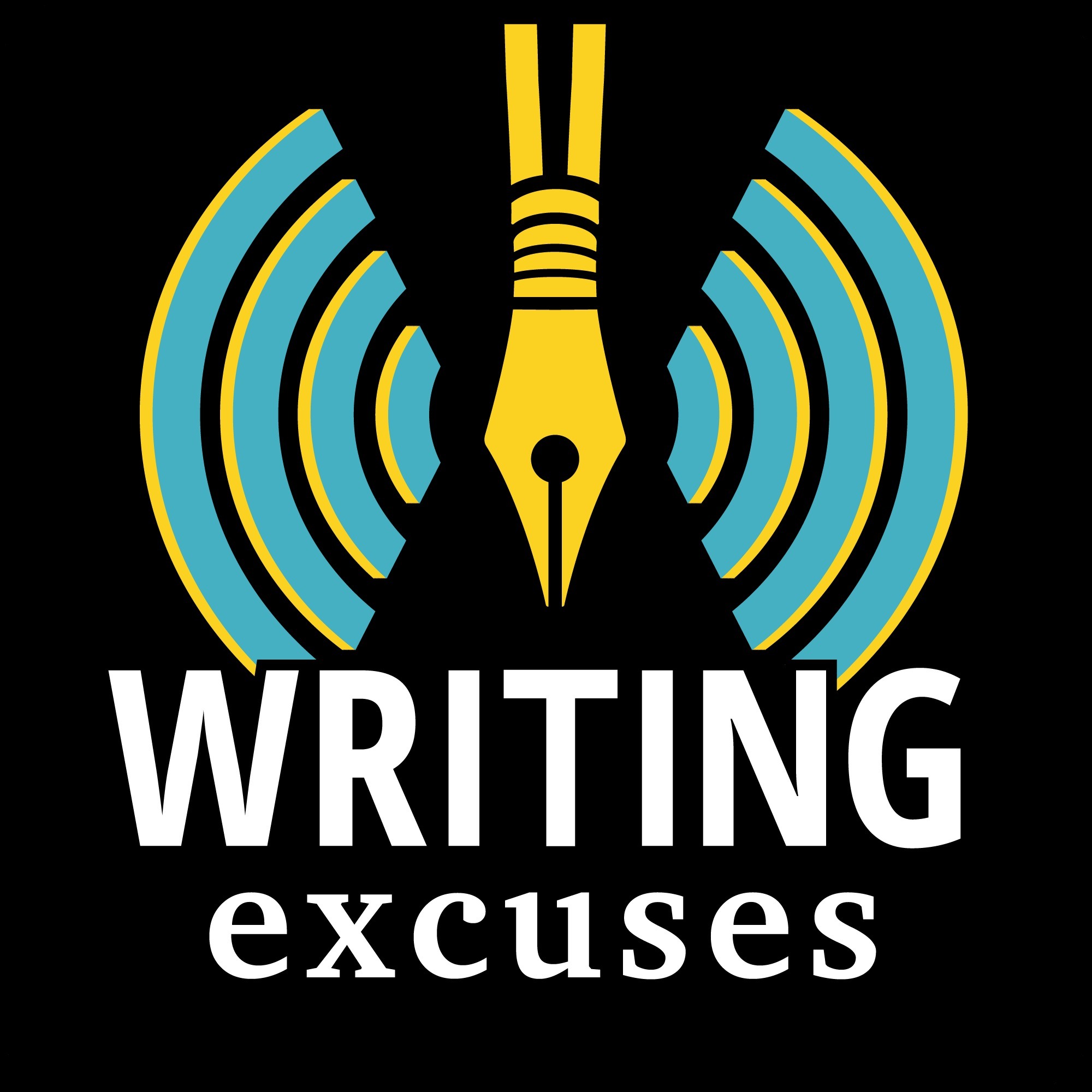Shows

Writing Excuses20.49: Using Tone and MoodThis week, Mary Robinette pulls back the curtain on some of fiction’s sneakiest power tools: tone and mood. Drawing from a recent craft class she taught for her Patreon, Mary Robinette breaks down how these elements shape a reader’s emotional experience—and why they deserve as much attention as plot or structure. DongWon, Erin, and Howard jump in to poke at the definitions, debate where tone and mood collide, and explore how contrast, character reactions, and even sentence rhythm can totally change a scene. Expect examples ranging from Wizard of Oz to Mike Flanagan as we dig into p...
2025-12-0725 min
Writing Excuses20.48: Now Go Write- How to Pitch Your WorkIn this episode, DongWon digs into one of the business topics of our upcoming craft book: pitching. How do you talk about your work so other people immediately understand its category, vibe, and why it matters? They break pitching into two parts—content (what you say) and presentation (how you say it)—and share concrete tools like comp titles, short taglines, and simple back-cover formulas to sharpen your pitch. You’ll hear how iteration, audience-awareness, and practicing aloud (think karaoke for pitches) turn a clumsy elevator spiel into something that lands. Tune in for hands-on advice you can use next t...
2025-11-3031 min
Writing Excuses20.46: Now Go Write- Break All The Rules (Part 2)In this episode, Erin returns with the final two “rules” from her section of our forthcoming book Now Go Write—and why it might be worth breaking them. With DongWon and Mary Robinette, Erin explores the classic advice to “show, don’t tell,” and the debate over whether magic needs a system. We unpack when these conventions can strengthen a story—and when they can get in your way.Homework: Choose one of the four rules Erin covered across both “Break All The Rules” episodes (20.45 & 20.46) and rewrite a scene from your own work to deliberately break it. See what changes w...
2025-11-1617 min
Writing Excuses20.41: DongWon Song’s Personal Writing ProcessWe’re continuing our episodes focusing on our hosts’ personal writing practices. Like Mary Robinette’s. DongWon’s involves a bit of… chaos. DongWon’s day job as a literary agent is demanding and unpredictable, so they often have to fit in their writing process into their free time. They are also often collaborating with other authors and friends (often writing for games)—so how does all of this inform their unique writing process? Well, first DongWon thinks a lot about the time and space that surrounds their writing– how can they make a simple, low-stimulation environment so that they can...
2025-10-1226 min
Writing Excuses20.12: Fashion as a Writing MetaphorToday, we’re returning to different personal metaphors for how we all think about writing and storytelling. In this episode, we’re talking about how DongWon uses fashion as a helpful metaphor to think about storytelling. For both fashion and writing, whether you know it or not, you are already engaging with it every single day of your life. You are writing emails, you are communicating with the people around you, you’re dressing yourself, you’re wearing certain things and not others, and you’re ordering pizza! But what’s the difference between ordering a pizza and performing a poem? Well...
2025-03-2129 min
Writing Excuses19.48: Beginning With A ThrillAs we wrap up our Close Reading Series, we’re shifting our focus towards helping you integrate what you’ve learned. For December, we’ll be releasing episodes designed to help you make measurable progress on a writing project. So dust off your current work-in-progress, or pull out your brainstorming documents—we’re here to help you finish the year strong.Today, we’re focusing on beginnings. The titular phrase “beginning with a thrill,” doesn’t have to mean a burst of action or violence, but more so refers to how you hook your reader within the first few pages of...
2024-12-0120 min
Writing Excuses19.42: A Close Reading on Structure: Whose Perspective is it Anyways?Structure and POV (point of view) are often intertwined. In N.K. Jemisin’s The Fifth Season, we see this in the myriad perspective shifts. In this episode, we talk about the importance of these shifts on the structure of the book. How does the narrator talk directly to us, and what purpose does this second-person perspective serve? DongWon shares one of their theories with us on the relationship between author, reader, and POV. P.S. Do you want a signed special edition copy of The Broken Earth Trilogy by N.K. Jemisin? Preorder The...
2024-10-2021 min
Writing Excuses19.37: A Close Reading on Tension: Movement and ResolutionToday, we’re using music as an entry-point for tension. Howard introduces us to the power of the half-step, and other musical metaphors that can help you to incorporate tension in a new way to your writing. And then DongWon updates the metaphor with an electronic dance music analogy. We also dive into questions you can ask as you weave tension into your work in progress, such as, “what does your character have to gain by withholding their secret?” Thing of the Week: Clueless (the movie!) Home...
2024-09-1521 min
Writing Excuses19.25: From the Classroom to the PageLearning is great, but how do you translate it into doing without getting overwhelmed? What is the difference between learning in the classroom and executing when you're on your own?Marshall, our incredible recording engineer, just finished an MFA program. Congrats, Marshall!! On today’s episode, we gril Marshall in order to understand his takeaways from the program. Specifically, we are interested in how he takes everything he learned in the classroom and turns it into actionable things he’s doing on the page. We talk community, motivation, and how to consistently make time for your writing. ...
2024-06-2325 min
Writing Excuses19.24: An Interview on Worldbuilding with Arkady MartineWe've spent the last month talking about "A Memory Called Empire, and now, we are so excited to welcome the author, Arkady Martine, to the show! On today's episode, we talk with Arkady about the origins of her novel, and dive into how she navigated the dense and intricate world-building. Arkady gives us advice on what not to do, where to look for your first ideas, and what her writing process looks like. Thing of the Week: “The Shamshine Blind” By Paz PardoHomework:Using the character and the st...
2024-06-1635 min
Writing Excuses19.23: Tying It All Together (A Close Reading on Worldbuilding)Today, the gang talks about their final thoughts on Martine’s “A Memory Called Empire.” We conclude with some lessons we’ve learned through analyzing her work, and we share our favorite bits! Thing of the Week: Pasión de las PasionesHomework: Find a piece of world building that you love and come up with another way to use it in your work in progress. Close Reading Series: Texts & TimelineNext up is Character! Starting July 7, we’ll be diving into three short stories by C.L. Clark. These...
2024-06-0922 min
Writing Excuses19.22: Technology and Identity (A Close Reading on Worldbuilding)The imago technology lies at the heart of this novel thematically and narratively. How does this technology create a world, delineate Mahit's culture from Teixcalaan, and ask enormous questions about identity and empire?Thing of the Week: “Rotten” (Documentary Series available on Netflix)Homework: Come up with three technological or magical approaches that would raise questions about what it means to be you, to be an individual. Take one of these, and then write a scene wherein two characters argue about it. For those of y...
2024-06-0226 min
Writing Excuses19.21: Language as a Tool (A Close Reading on Worldbuilding)What cultural and worldbuilding information is embedded within the smallest of word choices? Today, we dive into three specific sections from throughout Martine’s “A Memory Called Empire”: the word for empire, assimilation and naming, and learning the word for bomb. We unpack how Martine uses language to establish important principles of how the world works. Thing of the Week: The Gilded Age - Created and Written by Julian Fellowes Julian Fellows (on HBO Max) Homework:Write a scene that describes a fictional piece of literature—...
2024-05-2627 min
Writing Excuses19.20: How to Make Worlds Feel Big Without Overwhelming the Reader (A Close Reading on Worldbuilding: Focusing on Scale)How do you use language and scale to focus your writing? Today, we think about scale and movement across vast spaces. What do characters’ movements tell us about empires and also—force? We talk about Martine’s incredible work establishing an empire across time, not (just) space. We read aloud some of Martine’s writing, and try to understand exactly how they work, and what they’re doing to build the novel’s world. A refresher on why Worldbuilding is essential and some working definitions of how we want to talk about it. After the break, we...
2024-05-1927 min
Writing Excuses19.19: A Close Reading on Worldbuilding: An Overview and why A Memory Called EmpireWhy is worldbuilding is essential in your writing? Today, we answer this question and dive into some working definitions of how we want to talk about it. After the break, we discuss why we chose this book Arkady Martine’s “A Memory Called Empire” and highlight what it does well. We dive into the elements that help make Martine’s worldbuilding so accessible and effective. Thing of the Week: “Fast Car” by Tracy Chapman (think about what it teaches you about POV!)Homework: Pick your favorite fictio...
2024-05-1228 min
Writing Excuses19.18: How to Build Fictional EconomiesSometimes we know the action and themes of your story, but you don’t know how to build an economy that supports those. Well today, we explain just how to do that! What are some questions you can ask yourself about the worth of certain goods and services in the world you’re building? What would a post-scarcity world look like and ask of your characters and how would it shape their wants? We loved recording this episode, it brought up so many interesting questions for us, and we hope it does the same for you! ...
2024-05-0526 min
Writing Excuses19.17: Novellas- the Goldilocks of PublishingHow do you find the right size for your story? And speaking of size, what do novellas do differently than both short stories and novels? What even is the difference between a novel and a novella? How many characters do they usually have? How many subplots? How do you know if your story should take the form of a novella or a novel? We dive into all these questions (and…you guessed it… more!) in our conversation. A note on the structure of Season 19: in between our close reading series (six episodes where we dive...
2024-04-2828 min
Writing Excuses19.16: An Interview with Max Gladstone and Amal El-MohtarToday we get to talk to the inimitable Max Gladstone and Amal El-Mohtar. Amal and Max are on the podcast to tell us about how they wrote a book together (hint: they didn’t write it together in the form of one voice.) They talk to us about the practice of writing letters, collaboration, and the revelation of friendship. They talk about the complexity, harmony, and cadence of two-author projects. We also talk about that voice in your head that criticizes your writing, and how to work with it and harness your authentic desire to tell a certain story.
2024-04-2147 min
Writing Excuses19.15: A Close Reading on Voice: Tying It All TogetherAs we conclude our first deep dive of our close reading series, we want to explore how the evolution of voice helped carry readers throughout "This Is How You Lose The Time War." We also talk about the relationship between character arcs and language, learning and voice. Stay tuned for next week’s episode, where we interview Max Gladstone and Amal El-Mohtar on what it was like to write “Time War” together! Thing of the Week: Princess WeekesHomework:Write a short outline of your work not...
2024-04-1425 min
Writing Excuses19.14: A Close Reading on Voice- Epistolary Storytelling Through VoiceWhat's epistolary writing? Well, it's writing through letters. But it's also a lot more than that. As we continue to dive into the concept of Voice, we want to explore the importance and power of the letters that Blue and Red write to each other throughout "This Is How You Lose The Time War." If you haven't already listened to our episodes introducing this novella, we recommend you go back and start with Episode 11 (of this season, Season 19)!And if you’ve been reading along with us while listening to these episodes, please let us know on In...
2024-04-0725 min
Writing Excuses19.13: A Close Reading on Voice: Blue's Perspective - Confidence and VulnerabilityOn our third episode diving into Voice through the novella “This Is How You Lose The Time War,” we begin to explore the different voices that make up the two main characters in the story. Last episode we dove into Red’s voice– if you haven’t already, we recommend you listen to that first! Today, we are doing a close read of Blue at the tea shop and how voice establishes character, growth, and vulnerability. How do the authors make Blue’s voice distinct from Red’s? Is it in the tone, the structure, or something else completely...
2024-03-3123 min
Writing Excuses19.12: A Close Reading on Voice - Red's Perspective - Muscular ProseToday, we are doing a very close read of Red's opening narration and how Red’s voice communicates both character and world in an effective and efficient way. We read several sections aloud and dive into what each sensory detail is doing. Also Mary Robinette talks about what she thinks is the most effective way to draw your readers attention to something. Thing of the Week: Planet Crafter Homework: Take a sentence from your work in progress and rewrite it to adjust the age of the character to make them a child. Do it again to m...
2024-03-2426 min
Writing Excuses19.11: A Close Reading on Voice- An Overview, and Why Time WarThe book that became a New York Times Bestseller because of a tweet. Well, it won LOTS of awards when it came out, but it was rediscovered by a Twitter account with a large following. So-- let's get into it!On our first episode diving into Voice using the short novel "This Is How You Lose The Time War", we talk about why Voice is essential and some working definitions of how we want to talk about it. We also explain why we chose this book and highlight some of the things it's done well, and what...
2024-03-1724 min
Writing Excuses19.10: Introducing Our Close Readings SeriesYou’ve probably seen us posting about our Close Reading Series, and in his episode, we finally officially introduce it! For most of the remainder of 2024, we’ll be diving into five core elements of writing by focusing on five different literary texts. We’ll spend five episodes on each one, and then we’re going to… drumroll please… interview the author(s)!As you know, we’ve spent lots of time reading, writing, talking, and recording our thoughts about different elements of the craft. But this year, we wanted to ground our episodes in specific texts...
2024-03-1023 min
Writing Excuses19.09: LIVE Recording - Rituals, Rites, and TraditionsHosts Erin and DongWon are joined by Fonda Lee and Mahtab Narsimhan for a special episode about creating traditions in your fictional writing. In this episode, we'll explore some of the following: -How do you build traditions and rituals in your fictional world (choosing what becomes a tradition or ritual and what doesn’t)? -How can you use rituals or traditions to advance a novel’s plot, give characters more depth, and create conflict? -What are the pitfalls to avoid (depiction of closed practices, over-ritualizing common traditions)?
2024-03-0317 min
Writing Excuses19.08: NaNoWriMo Revision with Ali Fisher: Working with an EditorAn agent, an editor, and a writer walk into a Zoom room and record a podcast... but really... that's (part of) what this episode is!First off, a reminder that your agent, your editor, and you are all on the same team! They are all trying to make the same book (your book!) a better book. Whether you've published before or are just starting your first short story, we are so excited for you to dive into this episode. For our final episode in our three-part series on revising your NaNoWriMo manuscript—or any other la...
2024-02-2529 min
Writing Excuses19.07: NaNoWriMo Revision with Ali Fisher: IntentionFor our second episode in this three-part series on revising your NaNoWriMo novel—or any other larger project you have—we are diving into intentions with Tor editor Ali Fisher. We asked her how she helps writers figure out what their books are about, and how she helps set intentions for revisions. Ali talks with us about how its important to be kind to yourself -- and your writing-- during the revision process. She also gives us advice for how you, as a writer, can lean into what you do well. Homework: From edito...
2024-02-1825 min
Writing Excuses19.06: NaNoWriMo Revision with Ali Fisher: LengthAli Fisher, editor at Tor Books and member of the podcast Rude Tales of Magic, joins us for a three-part series on editing. First up: length! How do you edit your work—whether it's a book or a short story or a novella? Maybe you wrote a draft during NaNoWriMo, maybe you didn't-- either way, we want to help you figure out how to make your writing the perfect length. Homework: Find two scenes next to each other from your writing. Remove the scene break and write bridging text between the two of them instead. Th...
2024-02-1127 min
Writing Excuses19.05: LIVE Recording - Revisions with Mahtab NarsimhanSome writers love revisions and some would rather scrub the toilet than revise their writing. On this episode, we are joined by author Mahtab Narsimhan, who many will recognize as a host from past seasons! Mahtab talks with our hosts about how she thinks about revisions. How do you revise your writing? What is the difference between revising and rewriting? Mahtab describes her favorite techniques and provides tips to make it more manageable. Homework Assignment from Mahtab Narsimhan:Take the first 3 chapters of your finished draft and distill it b...
2024-02-0420 min
Writing Excuses19.04: LIVE Recording - Pacing with Guest Fonda LeePacing is one of the most subjective and difficult aspects of storytelling to get right. What is pacing? How do you know what the right pace is for a story, and what techniques can you use to speed up or slow down your narrative?Homework Assignment from Fonda Lee: Take a page of a work-in-progress project and experiment with the pacing. Ideally, this should be a page with some dialogue or tension between characters. First, try to speed it up: cut description, be tight with dialogue, move the scene quickly. Then do t...
2024-01-2819 min
Writing Excuses19.03: Behind The Scenes with our Producer and Recording EngineerA few months ago, we were on a cruise ship in Alaska recording podcast episodes for 2024!This live recording features a Q&A with cruise attendees, who were given the opportunity to ask questions to Marshall Carr, our audio engineer, and Emma Reynolds, our producer. In this episode, we talked about the benefits of MFA programs, astrology, and how to continue learning without being overwhelmed. Homework from Emma Reynolds: What homework would you give yourself as a writer today? What homework would you have given yourself a ye...
2024-01-2122 min
Writing Excuses19.02: Q&A Episode with WX Core CastWe have a LIVE podcast recording from September 2023, when we were hosting one of our writing retreats on a cruise ship in Alaska! (To learn about our next WX Retreats, check out: https://writingexcuses.com/retreats/ Or apply for our scholarships by January 31 at https://writingexcuses.com/scholarships/This episode features questions from our writers, and those who attended our 2023 WXR Cruise to Alaska! We answered questions about success, what happens after you’re a NYTimes bestseller, and how you can record your own audiobook. Homework: Go listen to th...
2024-01-1421 min
Writing Excuses18.53: Funding the Writing LifeRent isn't paid in words alone. How do all of us, in various stages of our careers, keep ourselves afloat as we go about the writing life? We're getting in the weeds with this one - tips, tricks, and tools. We share our thoughts on diversifying your income stream outside of traditional publishing? Let’s get creative. We’re talking about school appearances, copywriting, fellowships, consulting, and teaching. We also share advice about newsletters, Patreon, monetizing yourself, and how an agent can help you overcome your imposter syndrome, Homework: Wri...
2023-12-3126 min
Writing Excuses18.52: Writing Inside The Box"Your short story should definitely be a novel." It's something writers are often told when they write short stories. What tips and tricks can you use to keep your idea within the length of the story you're trying to tell? We dive into worldbuilding in miniature, pacing, and character development. We also think about where you can edit your writing down—whether it’s words, plot threads, or characters. Homework: Write a scene with two different endings - one that puts a button on the story (for short fiction) and one that asks a...
2023-12-2423 min
Writing Excuses18.51: So You Wanna Play With Format?Are you interested in experimenting with different writing forms? Do you want to try an unusual or different way of writing? Well this week, we have an episode dedicated to non-traditional formats for writing. In this episode, we think about experimental short fiction from the point of view of publishing and writing. DongWon shares about the incredible success of their publishing of .. Why short stories might be the perfect place for new ideas. We talk about second-person narratives, epistolaries, footnotes, and stories written as research papers. When does it ma...
2023-12-1724 min
Writing Excuses18.50: The Unreliable NarratorAll unreliable narrators aren't unreliable in the same way. How do they differ and how does that change the way that we write them? Erin shares her unified theory (look at the graphic below!) of unreliable narrators. Homework: Take an event that you're familiar with, and write about it as truthfully as possible. Then write about it from the point of view of someone who knows the basics, but not the whole truth, but who tries to tell the entire story anyway. For bonus points, tell the story a third time from th...
2023-12-1026 min
Writing Excuses18.49: Giving Your Story A VoiceWhat does it mean if your writing is voice-y? How do you give your character a natural voice? We approach this question from the high-level perspective of craft, and the granular level of word choice and sentence structure. Erin talks about the research she did about Appalachian English for her short story Wolfy Things. And Mary Robinette Kowal tells us what it’s like to be an audiobook narrator, and how this helps her bring characters to life on the page. Just a reminder that our final episodes of the year will be guided by t...
2023-12-0324 min
Writing Excuses18.48: NaNoWriMo Week 5 - Writing EndingsWelcome to the last week of National Novel Writing Month! It’s okay if you aren’t going to finish your book, and it’s also okay if you don’t have 50,000 words! You still did a thing—you created a story that didn’t exist We want to talk about endings. How do you even write the end of a book? How do you do NaNoWriMo? There’s no right way! But there are several elements that can help you figure out how to write the end of your book. Our hosts give you guidance fo...
2023-11-2623 min
Writing Excuses18.47: NaNoWriMo Week 4 - Climaxes, or OH MY GOD NOIt’s week four of NaNoWriMo! Or, National Novel Writing Month, which happens every year for the month of November. This week, we are talking about how to write climaxes, how to write resolutions, and what exactly the three-quarter mark is. How do you write a climax scene? How to keep your tension going while also finding some resolution. How do you keep track of what you promised your reader at the start of your book? Our hosts dive into these topics and share examples from their own published writing. We talk about how to...
2023-11-1922 min
Writing Excuses18.46: NaNoWriMo Week 3 - Raising the StakesWe are now three weeks into NaNoWriMo—where writers are attempting to write a novel in the month of November. For this episode, our writers talk about how to raise the stakes in your story. To make something feel more threatening, you don’t have to make it bigger or flashier, but you do have to make it more personal to your character. Often, you don’t need to add an event or plot element, but simply ramp up your character’s connection and reaction.We also talk about multi-thre...
2023-11-1220 min
Writing Excuses18.45: NaNoWriMo Week 2 - Inciting IncidentWelcome to the first official week of National Novel Writing Month (or, almost the end of this week)! In this episode, we dive into how to write an inciting incident. What is an inciting incident? It is often the thing that goes wrong in your story. Within the first page, writers should have something go wrong. But what should this thing be? Our writers have some advice for questions you can ask yourself in order to understand your novel’s inciting incident. Also, Dan shares a recipe for an inci...
2023-11-0522 min
Writing Excuses18.44: NaNoWriMo Week 1- Getting StartedWelcome to National Novel Writing Month! For November, writers all over the world are trying to complete a novel, or write 50,000 words. In honor of NaNoWriMo, all of our November episodes are going to focus on writing a novel or big project. For our first week—starting! How do you start writing? What do you need to give your readers in at the beginning of your story? How much information is too much information? We answer all of these questions, and talk about how these factors will help shape your story, in our NaNoWriMo kickoff episode! Yo...
2023-10-2919 min
Writing Excuses18.43: Worldbuilding in MiniatureIf you're writing short fiction, how much of your world do you even need to figure out? Should you have it all written out? Can you just wing it? This week on the podcast, we discuss how much of a world to build for a short story (and how). We provide some guiding questions that you can use to build the world of your novel or short story. We explore different narrative structures, DND worlds without police, and the reader's experience. Homework: Take a big world-building concept and pick one or two iconic elements that br...
2023-10-2224 min
Writing Excuses18.42: Creating Magic Outside of a SystemHow do you write about magic? How do you build a world with magic and spells and potions? We dive into the rules and laws behind magical worlds. We often think of magic as being with a system, but what if it's not? What opportunities and challenges do intrusive magic/emergent fantasy and fabulism create for writers and stories?Our writers and publishers talk about cultural differences across magical systems, and how you can build a fantasy world that is believable. We also talk about surrealism, dream logic, and how sometimes the belief in magic is enough.
2023-10-1527 min
Writing Excuses18.41: Deep Dive: Erin's Short Fiction ExtravaganzaIf you write short stories or enjoy speculative fiction, this episode is for you. Our host Erin Roberts has written short stories, interactive fiction, and has built worlds for tabletop roleplaying games (TTRPGs). For the next 8 episodes, we’ll be diving into three of her short stories. This week, Erin explains how to write outside of traditional genre classifications. We talk about the importance of antagonists, tone, and the horror genre. And we discuss how to decide if your short story should become a novel. We highly recommend you read Erin’s three short stori...
2023-10-0825 min
Writing Excuses18.40: How To Make Money From Your Hobby (with special guest Sandra Tayler!) Or, The Business of the End of Schlock MercenaryHow did Howard start making money from his hobby of drawing and writing comics? How did he self-publish? We have a special guest on this episode! Sandra Tayler—Howard’s wife, the editor and publisher for Schlock Mercenary, and a published author—talks about starting their business. We dive into uncertainty, quality of life, and “manic optimism.” We learn about how to use pre-ordering, PayPal, and Kickstarter. Howard also shares about his experience with long covid, how to generate multiple income streams, and what comes next. Homework:
2023-10-0132 min
Writing Excuses18.39: How To Write An EndingDeep Dive: Sergeant In MotionHow do you write an ending to a book? How do you finish something you’ve been writing for over 20 years? Howard Tayler talks to us about writing the ending to his serialized webcomic and space opera, Schlock Mercenary. We dive into how to write a resolution, how to finish a book, and how to finish a series. And we dive into the art of leaning into the tropes without leaning ON them.Homework: Write a one page outline for the ending of your current work in progress.
2023-09-2428 min
Writing Excuses18.38: How Do You Write A Series With Books That Stand Alone?Deep Dive: A Function of FirepowerHow do you write the middle of a book? How do you write an ending to a story? For this week’s episode about writing, we focus on Book 19 of Schlock Mercenary, the penultimate book in Howard Tayler’s series. We discuss ways to make a book feel self-contained, rather than just something to keep the beginning and the ending further apart. For reference, A Function of Firepower is the 19th Schlock Mercenary Book. We highly recommend you read this first, because this episode contains spoilers and in-depth conversations about...
2023-09-1725 min
Writing Excuses18.37: Mandatory FailureWe talk with Howard Tayler about the story structure of a story with a BIG disaster in the middle - one which we don't recover from until the next book. We also talk about the weight of world-building, how to write for your ideal reader. And Howard considers the question, what is the cost of death if immortality exists? For reference, Mandatory Failure is the 18th Schlock Mercenary Book; 1st in the 3-book finale to the 20 book mega-arc. We highly recommend you read this first, because this episode contains spoilers and in-depth conversations about t...
2023-09-1026 min
Writing Excuses18.36: The Soggy Middle Pays the Rent (or, "Stand Alone With Series Potential")How do you write the middle of a book? How do you end your book? How do you know what to write next? This week, our hosts —who all work as a writers and publishers (and are sometimes teachers and puppeteers and many other things)— talk through how they have written the middle of their books. The middle is where most of the story takes place. How do you keep track of your characters and plot? How do you bring it toward an end, and stick the landing? Well, we’ve got some ideas. And some...
2023-09-0326 min
Writing Excuses18.35: How to Organize Your Writing, or Managing the Mega-ArcLet’s talk about organization! This week, we’re talking about how and what to keep track of— characters, places, names, etc. How do you organize a book? How do you outline a novel? And don’t worry, we dive into the messy question, what is worth keeping track of in your writing? We also hear about how Howard and Mary Robinette have turned their planning tools (and research!) into money. Homework: Build a tool (spreadsheet, wiki, whatever) for tracking things in the universe of your writing. Start by thinking of three things to track—th...
2023-08-2722 min
Writing Excuses18.34: Seventeen Years of Foreshadowing18.34: 17 Years of ForeshadowingWhat can Normal Gossip teach us about foreshadowing and artful storytelling? Thinking about the 20 books that make up Howard Tayler’s Schlock Mercenary, our hosts discuss foreshadowing—our favorite examples, and our go-to tricks for structuring our own work. What does foreshadowing actually do for our work? Do we even need it? Well, yeah… it’s like invisible narrative scaffolding. But it’s also like a red herring. It’s so many things! Listen to us discuss the best ways to use it in your own work, in a way that sounds true to your...
2023-08-2023 min
Writing Excuses18.33.5: State Of The PodcastBonus Episode! Our first ever half-numbered episode! We are making some changes here on the podcast, and we wanted to talk to you about them. We hired a producer (Emma Reynolds), we have new interactive offerings on Patreon (office hours, livestreams, Q&A’s), and we are going to begin advertising! Don’t worry, you can subscribe to our Patreon to listen ad-free. Homework: Go check out our Patreon, sign up for our newsletter, and follow us on Instagram and Facebook! They are all linked below. Thing of the Week: Aut...
2023-08-1617 min
Writing Excuses18.33: Deep Dive: The Schlock Mercenary FinaleThe first episode in our eight-episode Deep Dive into Howard’s weekly webcomic strip, Schlock Mercenary. We grill Howard on how he taught himself to draw, why he decided to self-publish (hint: his wife, Sandra Tayler, helped him), and how he managed to write an ending. Homework: The "How it should have ended" game: write your own ending(s) to one or more of your favorite things. (For reference, watch some of How It Should Have Ended.) Thing of the Week: The Expanse (DongWon) Mentioned Links: Schlock Mercenar...
2023-08-1327 min
Writing Excuses18.32: The Kirsten Vangsness Expansion PackWe have a special guest episode! Kirsten Vangsness, Criminal Minds star, joins us to talk about her experience as a writer, actor, and playwright. She taught us how she deals with imposter syndrome, and how she uses performance as a writing tool. We also talk about self-actualization, cats, and filling your metaphorical art well. Homework:From Kirsten: Record yourself, stream of consciousness, talking about one of the big questions that crops up in your work. Then write a scene that asks this question. From us: Prepare for our next Deep Dive, by reading...
2023-08-0631 min
Writing Excuses18.31: Getting Personal: Mining Your Life for ThemesIn our final episode diving into how and why Dan wrote “Dark One: Forgotten,” talk about how you can take something personal and mine it for fiction. We also tackle the complicated question—Why should you be the one to tell your story? We think about the personal touches that you can add to your writing, and how people can hear when your story is personal. Homework:2 things! 1. Have you watched Criminal Minds? If you haven’t, you should! Next week, we have a special guest—Kirsten Vangsness who plays Penelope Garcia! Explore her other stu...
2023-07-3024 min
Writing Excuses18.30: Planting Supernatural SeedsHow do you slowly reveal the supernatural in an obviously supernatural story? How can you prepare your audience for a reveal without disclosing it too quickly? If someone is familiar with your writing, they know the genre and what to expect from it. We talk about how we work within these confines while also making space for surprises, magic, and the supernatural. Homework:Do a reread or rewatch of something with a big reveal (like the reveal in "Dark One: Forgotten.") Think about how your understanding of the story has changed since you have that...
2023-07-2323 min
Writing Excuses18.29: Collaboration And PartnershipWhat are the best practices for collaboration? How do you write in an established intellectual property (IP)? How do you write a new story in an established world? We dive into working with an individual or a group. We hear stories from our hosts about how they have navigated creative endeavors with different types of collaboration.Homework:Grab something on your TBR (to be read) pile and pick a random paragraph from it. Use that as the opening for a short story.Also prepare for our upcoming Deep Dive (starting in two episodes...
2023-07-1630 min
Writing Excuses18.28: Writing Conversational DialogueHow do you write dialogue that sounds natural? We have some things to keep in mind when you write conversations between characters. When people converse, they do so with more than just words. Body language, tone of voice, and societal context all play a role in understanding what a person means. How do you convey that on the page or in audio?Homework:Take dialogue you've written. Delete every third line, and replace those lines with blocking. Thing of the Week:Cunk On EarthMentioned Links:Credits...
2023-07-0925 min
Writing Excuses18.27: Framing StoriesHave you ever framed a story within a story? Are you looking for a way to add structure or tension to your story? In this episode, we contemplate the value that can be added to your writing by putting it into a framework. Our hosts discuss various frameworks in fiction—from Frankenstein to Dark One: Forgotten to The House of the Spirits. [“Dark One: Forgotten” Deep Dive Ep. 4] Homework:Take something you’ve already written (or are currently writing), and add a frame story to it. Start with a prologue and an epilogue. Has this c...
2023-07-0228 min
Writing Excuses18.26: Broadening Your Writing Wheelhouse: Video Game Dialogue, RPG Adventures, & MoreLet’s talk about the things you can write that are not typically what we talk about—formats that aren't novels and short stories. In this episode, we’re thinking about scripts, RPG adventures, video game dialogue, etc. What other forms are out there, and how can you apply the skills you already have to a new form? [“Dark One: Forgotten” Deep Dive Ep. 3] Homework:Take something that you’re working on, and identify two other formats that might work well for it (audio, video game, you name it). Think about how you would pitch—an...
2023-06-2527 min
Writing Excuses18.25: To Narrator or Not to NarratorIn our second episode on Dan Wells’ audio-only book, “Dark One: Forgotten,” we provide you with tools and advice to consider when deciding whether or not to have a narrator. We also talk about location-aware dialogue, or how you can have your characters info dump without it being an info dump. Homework:Take something that you’ve already written, and adapt it for audio. Thing of the Week:Earbuds Podcast Collective, a curated list of podcasts Credits: Your hosts for this episode were Mary Robinette Kowal, DongWon Song, Erin Roberts, D...
2023-06-1826 min
Writing Excuses18.24: “Dark One: Forgotten” Deep DiveThe team grills Dan on his audio-only book “Dark One: Forgotten,” which he co-wrote with Brandon Sanderson. We find out how he wrote a book that became a six-part audio series, and why exactly that form is important. *Please listen to “Dark One: Forgotten” before listening to this episode!*. Homework:What's a thing you know, but everyone else has forgotten? Come up with a supernatural reason why this is.Thing of the Week:Zombies, Run! Credits: Your hosts for this episode were Mary Robinette Kowal, DongWon Song, Erin Roberts, Dan Wells...
2023-06-1130 min
Writing Excuses18.23: Our Advice on Giving Advice“Show don’t tell” is probably the most famous advice given to writers. But. . . we don’t necessarily agree. In our final episode of our deep dive into publishing, we tackle advice: How do you give it? When do you not? Our hosts tell us about the advice they wish they followed and the things they don’t tell their students. Also: Mary Robinette teaches us a trick about puppet fingers. Homework:Write a letter to yourself a year ago describing what kind of skills are they going to need in order to confront the challenges that are com...
2023-06-0432 min
Writing Excuses18.22: On Mentorship: Sending the Elevator Back DownHow can we make publishing more inclusive? What role does mentorship play? And how can you reframe competition as collaboration? All this and more in this episode.Homework:What's one thing that you can do to make someone else's path easier? Can you take a step towards doing this this week?Thing of the Week:After Five - newsletters from Suyi Davies OkungbowaMentioned Links:On Sending the Elevator Back Down by DongWon Song Credits: Your hosts for this episode were Mary Robinette Kowal, DongWon...
2023-05-2831 min
Writing Excuses18.21: The Empathy Gap: How to Understand What Your Publisher is Telling YouThe relationship between a writer and a publisher is… one that isn’t talked about enough. So we made an episode about rejection letters, email etiquette, and empathy. As a writer, how do you talk with a publisher? Well, luckily we have someone who knows all about the publishing world because they’re an agent at a large publishing house. DongWon offers advice on how to interact with publishers from the perspective of someone on the industry side. (If you’re new here: DongWon Song is an agent at Howard Morhaim Literary Agency.) Then, we hear about our hosts...
2023-05-2128 min
Writing Excuses18.20: So You Want To Work In Publishing?Have you ever thought of being a publisher, but don't know if it's the right choice for you? In this episode, DongWon (an agent at Howard Morhaim Literary Agency) walks you through this world and gives you some tips for how to decide if publishing is the right career for you.Homework:Come up with a list of 3 things you've read. Think of things that can act as comp titles for your professional career and/or personal brand.Thing of the Week:Letters to a Writer of Color Edited by Deepa...
2023-05-1427 min
Writing Excuses18.19: What is Publishing For, Anyway?In this episode, we unpack what the publishing industry is, what exactly it does, and why it does it. We also outline the first steps for preparing to talk to an agent or publisher.Homework: If you had to sit down with a publisher today and convince them that there's a market for you book, how would you start doing it? Make a list of 3-5 titles that your book is similar to, and describe your target audience.Thing of the Week: Kate McKean’s Agents and Books on SubstackMe...
2023-05-0826 min
Writing Excuses18.16: Deep Dive: Publishing is Hard, by DongWon SongPublishing is hard. Also, Publishing is Hard is a newsletter from DongWon Song. In this episode we grill them about it.Our Sponsors:* Check out Gusto: https://gusto.com/WX* Check out Quince: https://quince.com/wx* Check out Talkiatry: https://talkiatry.com/WXSupport this podcast at — https://redcircle.com/writing-excuses2130/donationsAdvertising Inquiries: https://redcircle.com/brandsPrivacy & Opt-Out: https://redcircle.com/privacy
2023-04-1722 min
Writing Excuses18.15: Building a Mystery, Now With More ToolsBack in February, with Episode 18.8, we began exploring the process of writing a mystery story. That episode led us into a series of six episodes about tension, and the tools we use to create and manage it. And now, with this episode (and a toolbox full of tension) we're ready (we hope!) to revisit the creation of mystery stories. Credits: Your hosts for this episode were Mary Robinette Kowal, DongWon Song, Erin Roberts, Dan Wells, and Howard Tayler. It was recorded by Marshall Carr, Jr., and mastered by Alex Jackson.Our Sponsors:* Check out Gusto: h...
2023-04-1021 min
Writing Excuses18.14: Heavy Lifting with MicrotensionLet's take all our tension tools and apply them in tiny ways. A big application of tension might be an argument between two characters about a course of plot-important action. Microtension might be those characters arguing about how long to boil eggs. In this episode we'll explore some favorite applications of microtension, and the ways in which it can be layered to ramp up the larger, plot-focused tension. Credits: Your hosts for this episode were Mary Robinette Kowal, DongWon Song, Erin Roberts, Dan Wells, and Howard Tayler. It was recorded by Marshall Carr, Jr., and mastered by Alex Jackson.
2023-04-0317 min
Writing Excuses18.13: Finding the Core ConflictIn our ongoing exploration of tension, the time has come to examine conflict. It can be shaped and delivered in numerous ways, but you have to know the core conflict before you can make anybody feel tense about it. Credits: Your hosts for this episode were Mary Robinette Kowal, DongWon Song, Erin Roberts, Dan Wells, and Howard Tayler. It was recorded by Marshall Carr, Jr., and mastered by Alex Jackson.Our Sponsors:* Check out Gusto: https://gusto.com/WX* Check out Quince: https://quince.com/wx* Check out Talkiatry: https://talkiatry.com/WX
2023-03-2719 min
Writing Excuses18.12: The Long Shadow of Unanswered QuestionsOur continuing exploration of tension has taken us to a favorite technique: unanswered questions. Sure, this obviously applies to mysteries, but consider the question posed in romances: “will they get together?” In its simplest form, the unanswered question that forces a page-turn is "what happens on the next page?" In this episode we explore how to use unanswered questions to drive tension, and how to avoid some common pitfalls. Credits: Your hosts for this episode were Mary Robinette Kowal, DongWon Song, Erin Roberts, Dan Wells, and Howard Tayler. It was recorded by Marshall Carr, Jr., and mastered by Alex Jackso...
2023-03-1921 min
Writing Excuses18.11: Turning Up the Contrast With JuxtapositionOur deconstruction and categorization of tension continues this week with an exploration of Juxtaposition, which is a contrast between two elements that supplies tension by allowing the reader to insert themselves. Credits: Your hosts for this episode were Mary Robinette Kowal, DongWon Song, Erin Roberts, Dan Wells, and Howard Tayler. It was recorded by Marshall Carr, Jr., and mastered by Alex Jackson.Our Sponsors:* Check out Gusto: https://gusto.com/WX* Check out Quince: https://quince.com/wx* Check out Talkiatry: https://talkiatry.com/WXSupport this podcast at — https://red...
2023-03-1220 min
Writing Excuses18.10: Anticipation is More Than Just Making Us WaitLast week we talked about tension, and promised that we'd be breaking it down into more pieces. This week we're discussing one of those pieces: Anticipation. We sub-divided it as follows: Surprise Suspense Humor Promises We talk about how to create anticipatory tension well, where the pitfalls are, and how this fits into the creation of our stories. Credits: Your hosts for this episode were Mary Robinette Kowal, DongWon Song, Erin Roberts, Dan Wells, and Howard Tayler. It was recorded by Marshall Carr, Jr., and mastered by Alex Jackson.Our Sponsors:* Check out Gusto: https://g...
2023-03-0618 min
Writing Excuses18.08: Building a MysteryAfter last week's deep dive into The Spare Man we're ready to talk more generally about mysteries, and the tools we use to write them. Obviously we can't cover all of that in just one episode, but don't worry. In upcoming episodes we'll explore more of these tools in detail. Credits: Your hosts for this episode were Mary Robinette Kowal, DongWon Song, Erin Roberts, Dan Wells, and Howard Tayler. It was recorded by Marshall Carr, Jr., and mastered by Alex Jackson.Our Sponsors:* Check out Gusto: https://gusto.com/WX* Check out Quince: https://q...
2023-02-2023 min
Writing Excuses18.07: Deep Dive into THE SPARE MANSpoiler Alert! This week is our deep dive into Mary Robinette Kowal's The Spare Man. It's a sci-fi mystery novel often described as "The Thin Man in space." Deep dive episodes are necessarily full of spoilers because we ask all kinds of how and why questions specific to the writing of the work in question. If you haven't yet read The Spare Man, you might consider doing that before listening to this episode. We're not the boss of you, but we believe you'll get more out of this episode and the novel if you read the novel first. Credits: Y...
2023-02-1332 min
Writing Excuses18.06: An Interview With Howard TaylerYour Hosts: Mary Robinette Kowal, DongWon Song, Erin Roberts, Dan Wells, and Howard Tayler In this episode we interview Howard Tayler, one of the founding members of the podcast, and the creator of Schlock Mercenary. The first question: how did this twenty-year ride change you? And a later question: what comes next? Liner Notes: We'll eventually do a deep dive on the final three books of the Schlock Mercenary saga. You can read for free starting here. Credits: This episode was recorded by Marshall Carr, Jr., and mastered by Alex JacksonOur Sponsors:* Check out Gu...
2023-02-0620 min
Writing Excuses18.05: An Interview with Mary Robinette KowalYour Hosts: Mary Robinette Kowal, DongWon Song, Erin Roberts, Dan Wells, and Howard Tayler In this episode Howard Tayler conducts our interview with Mary Robinette Kowal, leading with a wide-open question: "Where did you even?" Mary Robinette talks to us about how she came to the world of writing, and some of the amazing things she picked up along the way. Credits: This episode was recorded by Marshall Carr, Jr., and mastered by Alex JacksonOur Sponsors:* Check out Gusto: https://gusto.com/WX* Check out Quince: https://quince.com/wx* Check out Ta...
2023-01-3021 min
Writing Excuses18.04: An Interview With Dan WellsYour Hosts: Mary Robinette Kowal, DongWon Song, Erin Roberts, Dan Wells, and Howard Tayler In this episode Erin Roberts very enthusiastically launches our interview with "OG" Dan Wells with a delightfully difficult question, paraphrased thusly: "is there advice you gave back in the early days that you still stand by today?" There are lots of other questions, including one about bacon! Credits: This episode was recorded by Marshall Carr, Jr., and mastered by Alex JacksonOur Sponsors:* Check out Gusto: https://gusto.com/WX* Check out Quince: https://quince.com/wx* Check out Ta...
2023-01-2321 min
Writing Excuses18.03: An Interview With Erin RobertsAs we announced in the first episode of the year (and in this press release), DongWon Song and Erin Roberts are joining us as permanent cast members. Today we're conducting an interview with Erin Roberts. She is newer to career writing than any of the rest of us, but her contributions to Writing Excuses have already been invaluable. In this episode we'll learn a bit more about why, and about what Erin will bring to the program going forward. Credits: This episode was recorded by Marshall Carr, Jr., and mastered by Alex Jackson
2023-01-1617 min
Writing Excuses18.02: An Interview with DongWon SongYour Hosts: Mary Robinette Kowal, DongWon Song, Erin Roberts, Dan Wells, and Howard Tayler As we announced in last week's episode (and in this press release), DongWon Song and Erin Roberts are joining us as permanent cast members. In this episode we conduct an interview with DongWon Song, plumbing a few depths, and learning a bit more about what they can teach all of us. Liner Notes: DongWon Song's newsletter, Publishing is Hard, can be found at publishingishard.com. It's free, but paid subscriptions are available. Credits: This episode was recorded by Marshall Carr, Jr., and mastered by Alex Jacks...
2023-01-0923 min
Writing Excuses18.01: Twenty Twenty-Three, By Way of IntroductionYour Hosts: Mary Robinette Kowal, DongWon Song, Erin Roberts, Dan Wells, and Howard Tayler We begin 2023 with some big changes, and in this episode we'll discuss those, starting with some changes to the core cast. DongWon Song and Erin Roberts are joining us as permanent cast members, and Brandon Sanderson is stepping aside with "emeritus" status. But the episode isn't just announcements. We each talk about where we are career-wise, what we're working on, and what we're excited to bring to the podcast this year. Credits: This episode was recorded by Marshall Carr, Jr., and mastered by Alex Jackson
2023-01-0224 min
Writing Excuses17.51: Feel The BurnLet's talk about burnout. It's been a long few years (with some of those years feeling like decades) so this may seem timely, but burnout can happen during otherwise ordinary times. Ignoring it or simply trying to "burn smarter, not harder" can have serious repercussions. In this episode we talk about why we burn out, how we recognize it, how we deal with it, and how we (eventually) recover from it. Your Hosts: Dongwon Song, Piper J. Drake, Peng Shepherd, Marshall Carr, Jr., and Erin Roberts Credits: This episode was recorded by Matthew Drake, and m...
2022-12-1819 min
Writing Excuses17.50: Consistency, Inconsistency, and the Crushing Weight of ExpectationsYour Hosts: Howard Tayler, Dongwon Song, and Dan Wells Thanks to some last-minute schedule changes, we almost didn't have an episode for today. Only three cast members were able to make it to the session, and none of those three had the syllabus. But we forged ahead anyway, and recorded an episode about why we felt it was important to record an episode. That may sound like one too many layers of meta, but just wait until we add the layers in which this actually applies to writing! Liner Notes: Dongwon's newsletter is called "Publishing is Hard." Dan's newsletter...
2022-12-1222 min
Writing Excuses17.39: Writing Bodies and Intimacy, with K.M. SzparaYour Hosts: Mary Robinette Kowal, Dongwon Song, Piper J. Drake, & Howard Tayler, with special guest K. M. Szpara CONTENT WARNING: this episode is about adult acts and adult bodies, and we won't be using euphemisms. K.M. Szpara joined us at WXR 2022 for this discussion of writing bodies and intimacy, with a particular focus on which kinds of words to use for things. Credits: This episode was recorded by Marshall Carr, Jr. before a live audience aboard Liberty of the Seas. It was mastered by Alex Jackson. Our Sponsors:* Check out Gusto: https://gusto.com/WX
2022-09-2619 min
Writing Excuses17.2: It Was a Promise of Three PartsYour Hosts: Howard Tayler, Kaela Rivera, Sandra Tayler, and Megan Lloyd The title of this episode comes to us from the first paragraph of The Name of the Wind, by Patrick Rothfuss—a novel which delights us with turns of phrase and evocative prose from beginning to end. We're continuing our exploration of "promises as a structure" by looking at the promises made by the prose of your first line, first paragraph, and first page. What does your first line say about the rest of your book? Did you mean for it to say that? Is your first line writin...
2022-01-1020 min
Writing Excuses16.34: Novels Are Layer CakesYour Hosts: DongWon Song, Mary Robinette Kowal, Dan Wells, and Howard Tayler Novels deliver a lot of information, and it's helpful to consider that delivery in terms of layers. Novels are layer cakes, and we're not talking about a three-layer birthday cake. We're talking about a dobosh torte, or a mille crepe cake. And if we've made you hungry for stratified pastry, that's okay, because we made ourselves hungry, too. Credits: This episode was recorded by Marshall Carr, Jr., and mastered by Alex JacksonOur Sponsors:* Check out Gusto: https://gusto.com/WX* Check ou...
2021-08-2320 min
Writing Excuses16.33: Tell, Don’t ShowYour Hosts: DongWon Song, Mary Robinette Kowal, Dan Wells, and Howard Tayler Few pieces of writing advice get repeated as much as that old saw "show, don't tell." We're here to show tell you that it's not only not universally applicable, much of the time it's wrong¹. Tell, don't show, especially in the early pages of the book when so very, very much information needs to be delivered² quickly. Credits: This episode was recorded by Marshall Carr, Jr., and mastered by Alex Jackson ¹ Fun fact: this advice comes to us from silent film, when it made great artistic sense to pu...
2021-08-1618 min
Writing Excuses16.32: First Page Fundamentals—THE KILLING FLOOR, by Lee ChildsYour Hosts: DongWon Song, Mary Robinette Kowal, Dan Wells, and Howard Tayler In this episode we explore the first page of The Killing Floor, by Lee Childs, with the goal of learning how to build good first pages for own own work. Credits: This episode was recorded by Marshall Carr, Jr., and mastered by Alex Jackson Liner Notes: here is the 1st paragraph of The Killing Floor, for reference. I was arrested in Eno's diner. At twelve o'clock. I was eating eggs and drinking coffee. A late breakfast, not lunch. I was wet and tired after a long walk in h...
2021-08-0921 min
Writing Excuses16.31: First Page Fundamentals—MOBY DICKYour Hosts: DongWon Song, Mary Robinette Kowal, Dan Wells, and Howard Tayler In this episode we explore the first page of Moby Dick, by Herman Melville, with the goal of learning how to build good first pages for own own work. Credits: This episode was recorded by Marshall Carr, Jr., and mastered by Alex Jackson Liner Notes: here is the 1st paragraph of Moby Dick, for reference. Call me Ishmael. Some years ago—never mind how long precisely—having little or no money in my purse, and nothing particular to interest me on shore, I thought I would sail about a...
2021-08-0220 min
Writing Excuses16.30: First Page Fundamentals—THE HAUNTING OF HILL HOUSEYour Hosts: DongWon Song, Mary Robinette Kowal, Dan Wells, and Howard Tayler In this episode we explore the first page of The Haunting of Hill House, by Shirley Jackson, with the goal of learning how to build good first pages for own own work. Credits: This episode was recorded by Marshall Carr, Jr., and mastered by Alex Jackson Liner Notes: here is the 1st paragraph of The Haunting of Hill House, for reference. No live organism can continue for long to exist sanely under conditions of absolute reality; even larks and katydids are supposed, by some, to dream. Hill House...
2021-07-2621 min
Writing Excuses16.29: Building TrustYour Hosts: DongWon Song, Mary Robinette Kowal, Dan Wells, and Howard Tayler How do we build trust with our readers? What does that even mean? In this episode we discuss ways in which we let our readers know what they can expect from the book they're holding, and how we set about getting the to trust us do deliver on those expectations. Credits: This episode was recorded by Marshall Carr, Jr., and mastered by Alex JacksonOur Sponsors:* Check out Gusto: https://gusto.com/WX* Check out Quince: https://quince.com/wx* Check ou...
2021-07-1917 min
Writing Excuses16.28: Common First-Page MistakesYour Hosts: DongWon Song, Mary Robinette Kowal, Dan Wells, and Howard Tayler Let's have a frank, and possibly painful discussion about the ways in which the first page can go wrong. It may seem like hackneyed writing advice, but rules like "don't start with the main character waking up" are rules for a reason. In this episode we'll talk about those reasons, and why it's so unlikely for books which break them to succeed with readers. Credits: This episode was recorded by Marshall Carr, Jr., and mastered by Alex JacksonOur Sponsors:* Check out Gusto: htt...
2021-07-1218 min
Writing Excuses16.27: Nobody Wants to Read a BookYour Hosts: DongWon Song, Mary Robinette Kowal, Dan Wells, and Howard Tayler Our controversial episode title comes to us via John Schwarzwelder, and it points up nicely the importance of today's topic, which is first lines, first pages, and how we set about convincing people (who may or may not want to read a book) to read OUR book. Credits: This episode was recorded by Marshall Carr, Jr., and mastered by Alex JacksonOur Sponsors:* Check out Gusto: https://gusto.com/WX* Check out Quince: https://quince.com/wx* Check out Talkiatry: https://ta...
2021-07-0518 min
Writing Excuses14.39: Positioning Your Book in the MarketplaceYour Hosts: Howard, Mary Robinette, Dan, and Dongwon "Positioning feels like the most important question in all of publishing." — DongWon Song In this episode we talk about how to ask and answer the question of positioning, which is "who is this book for?" Credits: This episode was recorded before a live audience aboard Liberty of the Seas by Bert Grimm, and mastered by Alex JacksonOur Sponsors:* Check out Gusto: https://gusto.com/WX* Check out Quince: https://quince.com/wx* Check out Talkiatry: https://talkiatry.com/WXSupport this pod...
2019-09-3018 min
Writing Excuses14.25: Choosing Your AgentYour Hosts: Howard, Mary Robinette, Dan, and DongWon Guest-host Dongwon Song joined us at WXR 2018 as an instructor, and gave great advice regarding the business side of working as an author. In this episode he takes us through a conversation about choosing an agent. Credits: This episode was recorded by Bert Grimm, and mastered by Alex JacksonOur Sponsors:* Check out Gusto: https://gusto.com/WX* Check out Quince: https://quince.com/wx* Check out Talkiatry: https://talkiatry.com/WXSupport this podcast at — https://redcircle.com/writing-excuses2130/donations
2019-06-2422 min
Writing Excuses14.12: Writing The Other — Latinx RepresentationYour Hosts: Dan Wells, Tempest Bradford, DongWon Song, and Julia Rios Julia Rios joins us to talk about writing characters who come from one of the many Latin-American cultures or subcultures. "Latinx" is a catch-all term for people with Latin-American heritage, including mixed-race people. In this episode we talk about mash-up cuisine, intersectionality, and how to navigate the subtleties to find the specific cultural elements which will help you create Latinx characters. Credits: This episode was recorded by Bert Grimm, and mastered by Alex Jackson.Our Sponsors:* Check out Gusto: https://gusto.com/WX* C...
2019-03-2420 min
Writing Excuses11.48: Elemental Issue Q&A, with DongWon SongDongWon Song, literary agent with HMLA, joins us for a Q&A on the elemental genre of "Issue." Here are the questions, which were submitted by the attendees at WXR '16: Can only certain people tackle certain issues in certain stories? Science Fiction often explores issues by changing the context. Why does this work? How would you handle an issue story in short fiction? How do you make sure to research the issue enough without paralyzing yourself with the fear that you cannot do it justice? How do you convincingly write a position with which you disagree without convincing y...
2016-11-2722 min
Writing Excuses11.46: Colonialism, with Steven Barnes, Tempest Bradford, DongWon Song, and Shveta ThakrarOur listeners have been asking for an in-depth, "crunchy" episode on colonialism, and related issues like cultural appropriation, for a couple of years now. Our voices, however, are not the ones our listeners should be hearing on the subject. Finding the right voices has not been easy, but it has been worth it. This episode runs for over 25 minutes. Steven Barnes, K. Tempest Bradford, DongWon Song, and Shveta Thakrar discuss colonialism with Mary Robinette Kowal. Brandon, Dan, and Howard simply listened, and learned. We encourage you to do the same. Liner notes: Here's the recommended reference reading — "Of Warrior Chi...
2016-11-1427 min